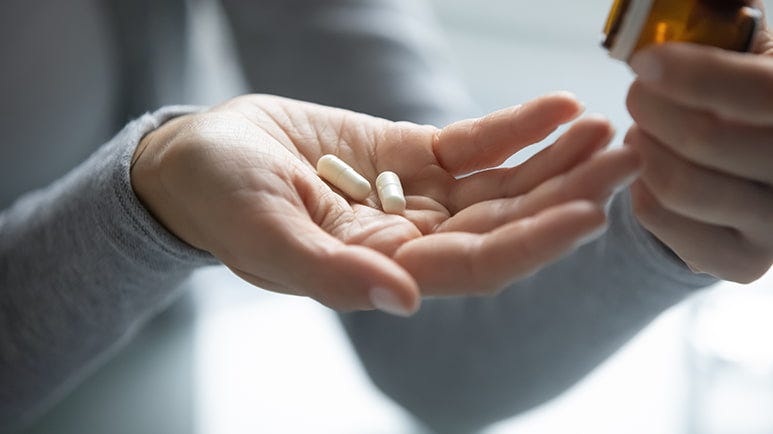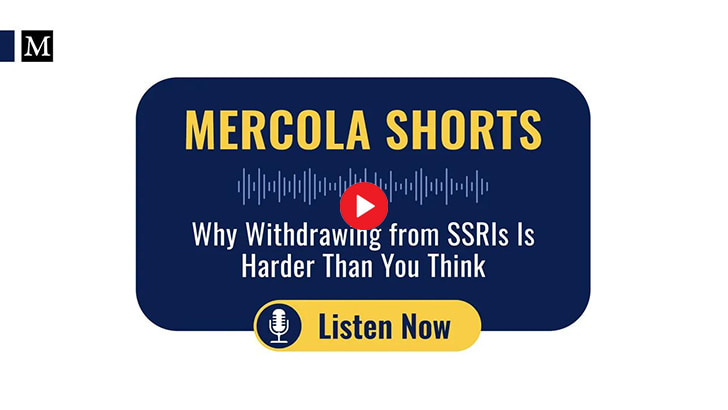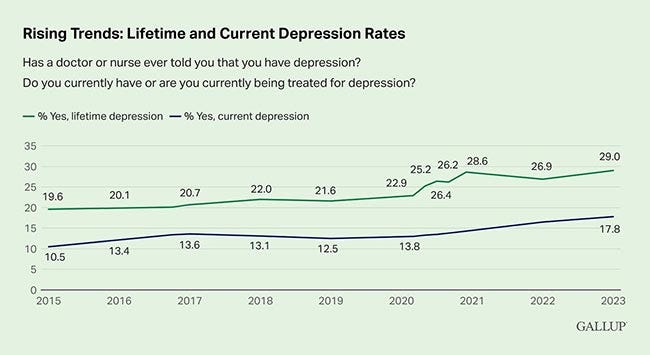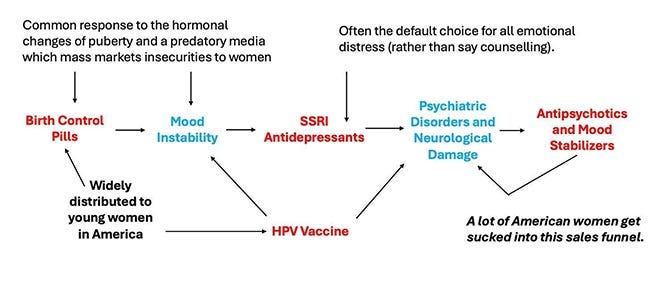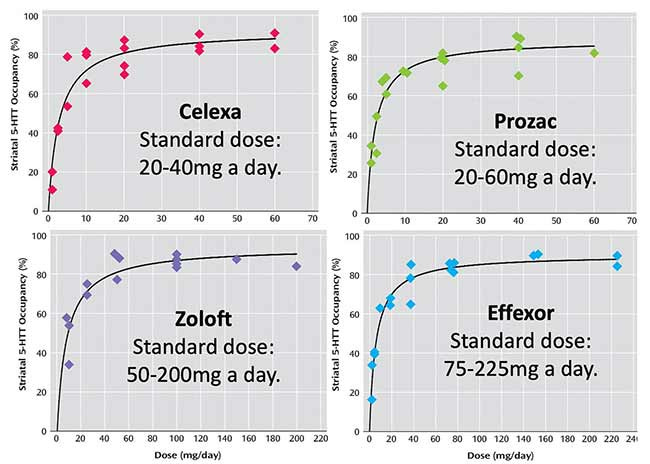The Hidden Dangers of Antidepressants and Why It's So Hard to Stop Taking Them
A silent crisis fueled by modern medicine is impacting millions. Can you recognize the early warning signs before it's too late?
STORY AT-A-GLANCE
SSRI antidepressants are some of the most harmful and overused medications on the market
Common side effects of SSRIs (and SNRIs) include emotional numbness, severe agitation, bipolar disorder, cognitive decline, sexual dysfunction, and birth defects
Psychiatry's denial of SSRI-related issues often leads to misinterpretation of side effects as signs of pre-existing mental illness, resulting in more medication and catastrophic consequences
SSRIs, like stimulant drugs (e.g., cocaine), are highly addictive, leading to severe illness during withdrawal, which affects approximately half of users
Withdrawal from SSRIs is often extremely difficult, with very few resources available for those trying to stop
Whenever I ask a holistic physician which commonly used medication classes they believe cause the most harm to society, SSRIs always are one of the top five.
Note: Statins (discussed here), NSAIDS like ibuprofen (discussed here), and PPI acid reflux medications (discussed here) frequently make the top five as well.
This is because SSRIs rarely benefit patients (only a minority of depressed patients have a metabolic type that responds to SSRIs) and the drugs have a large number of severe and often life-changing side effects. For example, in a survey of 1,829 patients1 on antidepressants in New Zealand:
62% reported sexual difficulties
60% felt emotionally numb
52% felt not like themselves
39% cared less about others
47% had experienced agitation
39% had experienced suicidal ideation
Many of these can be immensely impactful for individuals (e.g., SSRI sexual dysfunction is often permanent and frequently causes severe depression, while emotional anesthesia takes away the joy of life and can cause people to spend years, if not decades, in emotionally toxic situations).
Worse still, the SSRIs are somewhat unique in that they can also harm those not taking the drugs as they can trigger psychotic violence, which results in either suicide, homicide, and tragically, in numerous cases, mass shootings (discussed further here). Furthermore, the pharmaceutical industry was aware of this from the start, but chose to conceal all that evidence to sell the drugs (and only revealed it after lawsuits forced them to).
Note: Another example of a pharmaceutical that harms others is the COVID vaccine as it causes certain recipients to shed the vaccine and then significantly harm those around them who are sensitive to shedding — to the point numerous sensitive readers have shared COVID vaccine shedding has greatly impacted their lives (discussed further here).
Maximizing Sales
Much of the medical industry’s appalling conduct makes sense once its actions are viewed through a business lens that seeks to maximize sales. This for instance, is why the SSRIs, rather than being outlawed, were able to become some of the most successful drugs in history (e.g., in 2027, they are projected to be an 18.27 billion dollar global market2) and why almost all of their appalling side effects have been hidden from the public. Let’s review some of those unconscionable tactics.
Sales Funnels
A classic principle in marketing is to cast as wide a net as possible for your customers and then gradually pull some of those customers into costlier and costlier products. Since funnels gradually shrink as you go further down them, similar to how fewer customers will buy a product as it becomes more expensive, this method is often referred to as a “sales funnel.” With the SSRIs, a robust sales funnel exists as:
Through years of almost unbelievable marketing (discussed further here), depression was redefined to include the normal negative emotions of life. As such, depression became so subjective it became possible to market it to most of the population and patients frequently will ask their doctors to prescribe SSRIs after they encounter an emotional obstacle.
Numerous mass screening programs exist for doctors to diagnose if someone is depressed (e.g., this is routinely done for pregnant women and the elderly).
Once a patient is “depressed,” rather than using natural approaches that effectively treat depression, the medical system will aggressively push them to start SSRIs.
The SSRIs frequently cause a variety of psychiatric issues which require taking even stronger psychiatric medications.
This skit for example illustrates many of the sad absurdities behind a common SSRI sales funnel used on pregnant women:
Bipolar Disorder — An Unintended Outcome
Since the SSRIs antidepressants are stimulants, they often trigger mania. In turn, one of the most common problems associated with their use is bipolar disorder (a disease where you alternate from a depressed to a manic state).
To put this into context, in 1955, 1 in 13,000 people were disabled for bipolar, and the majority of patients who presented to the hospital for a manic episode permanently recovered. Now, bipolar affects 1 in every 20 to 50 people, and 83% of them are severely impaired in some facet of their lives.3 A significant amount of data has linked bipolar disorder to SSRIs. For example:
Yale researchers reviewed the records of 87,290 patients diagnosed with depression or anxiety between 1997 and 2001 and determined those treated with antidepressants converted to bipolar at the rate of 7.7% per year (three times greater than the rate for those not exposed to the drugs), ultimately resulting in between 20% to 40% of depressed patients becoming bipolar.4
A survey found 60% of bipolar patients only developed their illness after receiving SSRIs for depression.5
Peter Breggin reported that of 184 patients in the hospital starting Prozac, Zoloft, or Paxil, 11 developed mania and 8 became psychotic, and in Yale, 8% of 533 consecutive admissions were for mania or psychosis caused by antidepressants, and two patients heard voices commanding them to kill themselves.6
Note: The psychiatric field gets around this issue by claiming SSRIs “unmask” latent bipolar a patient always had — even though it likely would have never been “unmasked” had they never taken the SSRI in the first place.
Likewise, since the advent of mass psychiatric medicating, the character of bipolar has changed, becoming much more complicated to treat, characterized by much more rapid cycling between the depressed and manic states, and much more likely to produce severe complications like dementia later on.
Unfortunately, when the foremost experts in bipolar disorder presented these findings at the American Psychiatric Association’s annual conference and urged caution in the over administration of SSRIs, they were met with boos from their increasingly upset audience.7
As such, the link between SSRIs and bipolar disorder is rarely focused on, and instead the dangers of bipolar disorder (e.g., being 4 to 6 times as likely to die prematurely8) are continually emphasized to justify treating it.
This is remarkable given that a strong case can be made that many of the disastrous complications of bipolar disorder result from the highly toxic antipsychotics the disorder is “treated” with, especially since those same drugs are often given to schizophrenic patients, a disorder characterized by similar long-term complications (that are rarely seen in countries which do not use the drugs9).
In short, a robust sales funnel exists to create lifelong psychiatric medication users, best demonstrated by the fact spending an ever increasing amount of money to “treat” mental illness has only resulted more of it.10
Worse still, this sales funnel is particularly effective in capturing young adults who were raised in it (e.g., a recent post-COVID survey of those aged 18 to 24 found 42% had a mental health condition, including 37.8% with anxiety and 32.8% depression11) — and is particularly predatory towards young women:
Customer Retention
Since SSRIs “treat” rather than “cure” depression, they typically are a lifelong prescription (which is great for sales). However, since SSRIs have so many intolerable side effects and rarely help those who use them, tactics need to be used to retain those customers and safeguard their recurring revenue.
For instance, patients will often be told (sometimes not only by a doctor but also by a judge) that they lack the judgment to understand their mental illness, and they must hence take the prescribed medication.
Likewise, physicians rarely recognize the adverse effects of SSRIs. Instead, they are often trained to attribute them to the patient’s pre-existing mental illness (which frequently leads to horrendous gaslighting and patients sometimes being forced to take the medications against their consent).
SSRI Withdrawals
Like many other stimulants, SSRIs can be extremely addictive. In fact, SSRIs have such a high risk for withdrawals that merely changing an existing dosage or accidentally missing a pill can be sufficient to trigger severe withdrawals (e.g., this has caused many SSRI suicides12).
Unfortunately, when this happens, rather than recognize that withdrawals are occurring, physicians typically interpret them to mean the SSRI was effectively treating a severe (pre-existing) mental illness — and thus must urgently be resumed, even though the “mental illness” the patient exhibits was not present prior to them initiating the SSRI.
Likewise, since so few physicians know how to recognize the signs of SSRI withdrawals, almost none know how to treat it. As a result, individuals experiencing SSRI withdrawals frequently make the horrifying discovery that the safety net they thought existed simply isn’t there (an experience which likewise has been shared by many of those who developed significant complications from the COVID-19 vaccines).
As such, many who experience these withdrawals are forced to resume the drugs (as this is often all doctors can offer those patients), thereby ensuring customer retention.
Effects of SSRI Withdrawals
When withdrawing from an SSRI, severe withdrawals (e.g., becoming suicidal or violently psychotic) can happen. As such, I always urge readers to be extremely cautious in how they stop the medications.
However, far more frequently, less severe (and often fluctuating) withdrawal symptoms also occur such as:
The feeling of an electric shock in your arms, legs, or head (these horrible things are commonly referred to as “brain zaps”)
Dizziness (mild to severe)
Visual problems
Many sensitivities (e.g., to light, heat, a supplement or food)
Anxiety, which comes and goes, sometimes in intense 'surges'
Difficulty in getting to sleep and vivid or frightening dreams
Low mood, feeling unable to be interested in or enjoy things
A sense of being physically unwell
Rapidly changing moods (e.g., spontaneous weeping spells, attacks of sheer terror, or sudden plunges into unprecedented contentless black holes of pure dread)
Anger, sleeplessness, tiredness, loss of coordination and headache
A feeling that things are not real (‘derealisation’), or a feeling that you have ‘cotton wool in your head’
Difficulty in concentrating
Suicidal thoughts
Queasiness or indigestion
A feeling of inner restlessness and inability to stay still (this is known as akathisia and often precedes psychotic SSRI violence)
Crippling muscle pain or spasms
Worse still, these reactions are very common (e.g., I know more people than I can count who’ve experienced brain zaps).
In fact, a recent meta-analysis found that 56% of patients who stop using SSRIs experience withdrawals, that 46% who stop an SSRI experience severe withdrawals, and that these withdrawals last for weeks to months.13 Additionally, it is well known in the SSRI recovery community that the risk of a withdrawal varies greatly depending on the drug (e.g., Paxil is notorious for causing withdrawals, Cymbalta is also a common offender).
Note: A 1996 door-to-door survey of 2003 randomly selected people in England found that 78% of them considered SSRIs to be addictive.14
The pharmaceutical industry is well aware of this, to the point they will often deliberately put “placebo” subjects in SSRI trials into withdrawals (by terminating their existing prescription) so they can make the drug group look “better” than the “placebo” patients.
Note: This is similar to how Merck hid Gardasil's high rates of severe adverse reactions by using its toxic adjuvant (rather than saline) for the placebo group, resulting in similar injury rates in both groups, which, despite being extraordinarily high, went unquestioned by regulators.
Why Are SSRIs So Addictive?
For the roughly 50% of people who experience SSRI withdrawals, one of the most challenging things is how incredibly slowly they have to stop taking them. A major reason for this is due to the non-linear relationship between an SSRI dose and its binding to the brain. These graphs of how SSRIs bind the brain’s striatum explain why these drugs are so addictive.15
Essentially, they show that the standard doses are set far above the exponential phase of the curve. Because of this, it is often very easy to accidentally hit the exponential drop in the curve and suffer severe withdrawals. Most importantly, these graphs show that doses were chosen that are far beyond the exponential point — something many believe was deliberately done by the pharmaceutical industry to ensure these products would be incredibly difficult to stop using.
Because of this, individuals seeking to quit SSRIs often have to go at an incredibly slow pace (e.g., in many cases, sandpaper is needed to slightly decrease the current dose, and it often takes years of daily work to withdraw from an SSRI). To make matters worse:
If one withdraws from an SSRI too quickly, the nervous system can become sensitized and require an even slower pace for subsequently weaning off an SSRI. Likewise, once sensitized, individuals can also have strong reactions to a variety of other things in their environment that did not previously affect the individual.
When withdrawing from an SSRI, the process (e.g., what gets better and what gets worse) can often come in chaotic and unpredictable waves.
In many cases, using a supplement concurrently can often significantly worsen the withdrawal process (as a result they have to be phased in very slowly).
Patients are normally put onto multiple addictive psychiatric medications concurrently, so to quit them, typically only one can be withdrawn from at a time, and a great deal of deliberation must go into which one that is.
Certain SSRIs can be so difficult to withdraw from it must instead be gradually replaced with another less addictive SSRI.
Note: Many believe SSRIs' side effects are partly due to their numerous fluorine groups (which are on many but not all SSRIs). Amongst other things, we find fluorinated drugs tend to affect the central nervous system and are much more challenging for the body to eliminate (which we suspect is related to how fluorinated compounds persist in the environment).
Conclusion
When SSRIs were discovered, the industry created the mythology that they worked by fixing a serotonin deficiency in the brain. As the years went by, that was gradually disproven.16 As a result, the psychiatry field eventually concluded they instead worked by rewiring your brain (which is why psychiatrists tell you to keep taking an SSRI even if it doesn’t initially work as they want a few weeks for that “beneficial” rewiring to take place).
So, to “cure” an SSRI dependence (which is analogous to an addiction), you need to let the brain rewire itself back to normal, and until that happens, the brain will behave in an abnormal fashion (e.g., its ability to adapt to outside stressors in a healthy way is dramatically reduced). Since this is often a very slow back and forth process, the journey patients go through is frequently something like this as the brain tries to rewire itself:
If we take a step back, it’s absolutely appalling that a product like this could be allowed on the market, particularly since from the moment they became available, the FDA received more complaints about SSRIs than they did for any other drug — but nonetheless chose to relentlessly defend the SSRIs, even when both Congress and the America public did all that they could to shift the FDA’s position on them.
In short, as the world saw throughout COVID-19, no human cost was enough to deter this predatory industry from exploiting everyone to enrich itself, and sadly, as past tragedies like the SSRI saga show, this did not begin with the COVID vaccines.
Fortunately, due to our unique historical circumstances (e.g., the ascendancy of the “Make America Healthy Again” movement), a never before seen opportunity has emerged to hold these predatory industries accountable and force them to stop choosing profits over people.
As such, our goal for the next 4 years must be to do all that we can to help expose these egregious medical scandals, as the public is now very close to a tipping point on the medical-industrial-complex, so the more conversations we have about its predatory behaviors the sooner it will collapse.
Author’s note: This is an abridged version of a longer article which discusses the above points in much more detail and discusses how to safely withdraw from SSRIs. That article and its additional references can be read here. Additionally, a companion article about the depression industry and effective natural therapies for depression can be read here.
A Note from Dr. Mercola About the Author
A Midwestern Doctor (AMD) is a board-certified physician from the Midwest and a longtime reader of Mercola.com. I appreciate AMD's exceptional insight on a wide range of topics and am grateful to share it. I also respect AMD’s desire to remain anonymous since AMD is still on the front lines treating patients. To find more of AMD's work, be sure to check out The Forgotten Side of Medicine on Substack.
Disclaimer: The entire contents of this website are based upon the opinions of Dr. Mercola, unless otherwise noted. Individual articles are based upon the opinions of the respective author, who retains copyright as marked.
The information on this website is not intended to replace a one-on-one relationship with a qualified health care professional and is not intended as medical advice. It is intended as a sharing of knowledge and information from the research and experience of Dr. Mercola and his community. Dr. Mercola encourages you to make your own health care decisions based upon your research and in partnership with a qualified health care professional. The subscription fee being requested is for access to the articles and information posted on this site, and is not being paid for any individual medical advice.
If you are pregnant, nursing, taking medication, or have a medical condition, consult your health care professional before using products based on this content.



